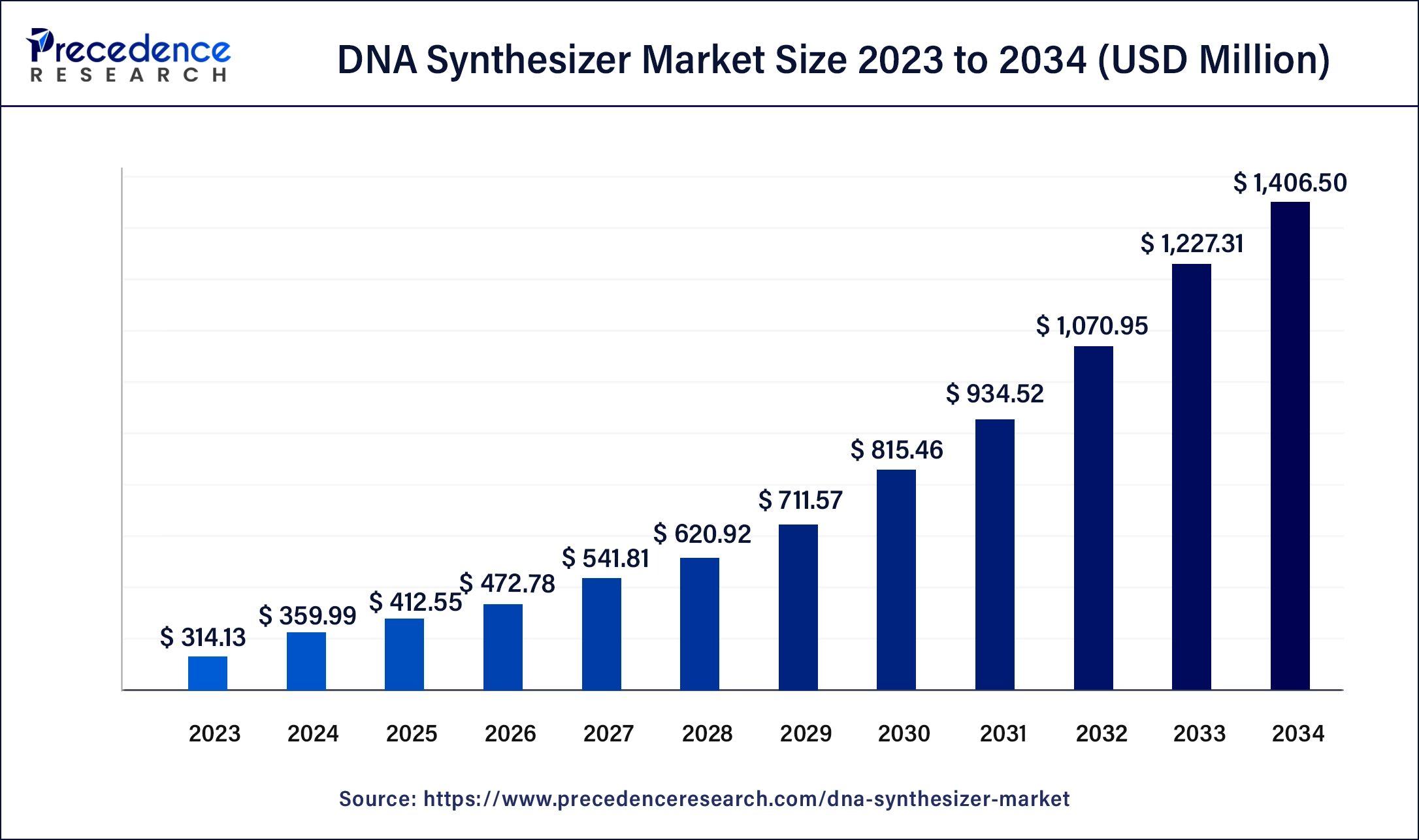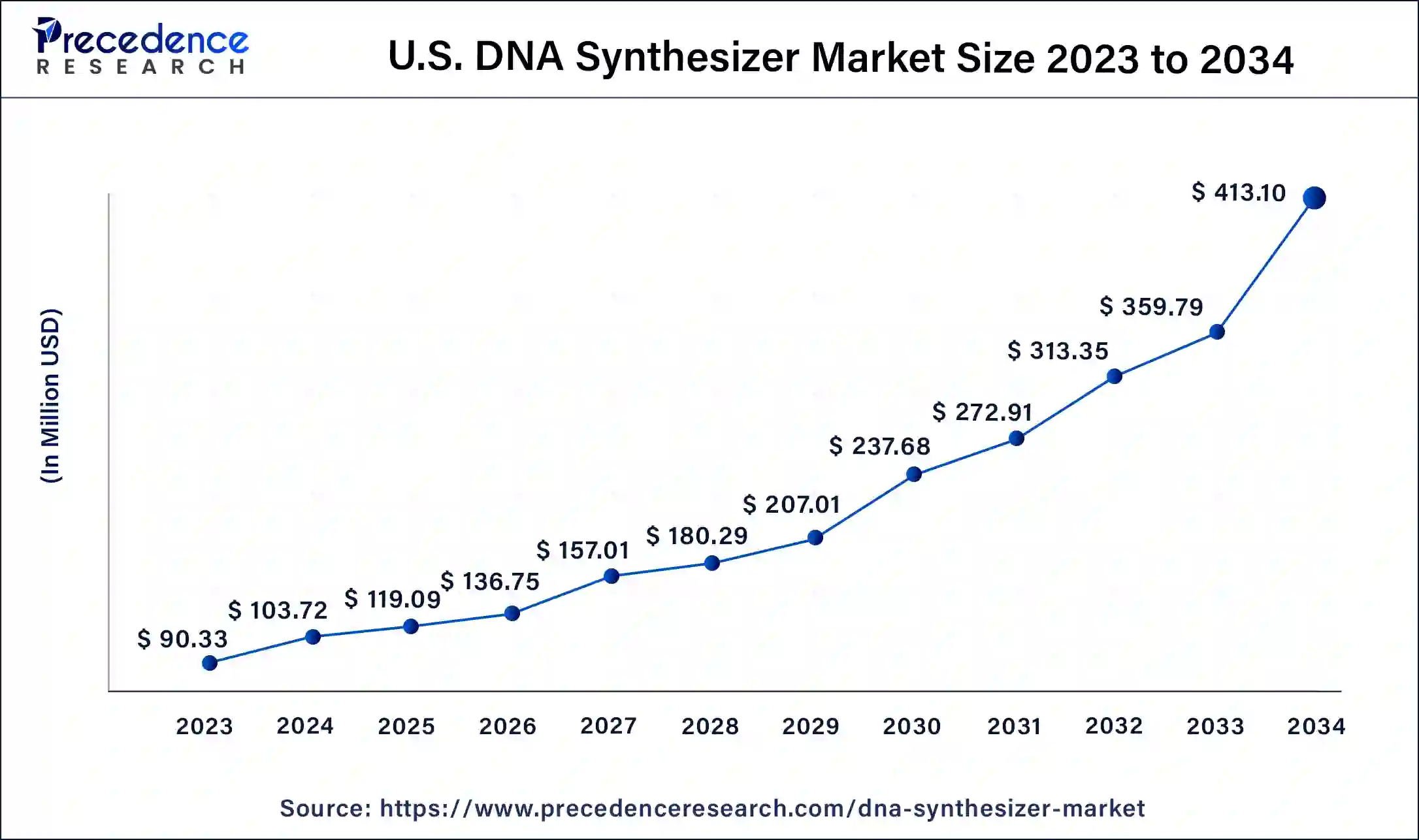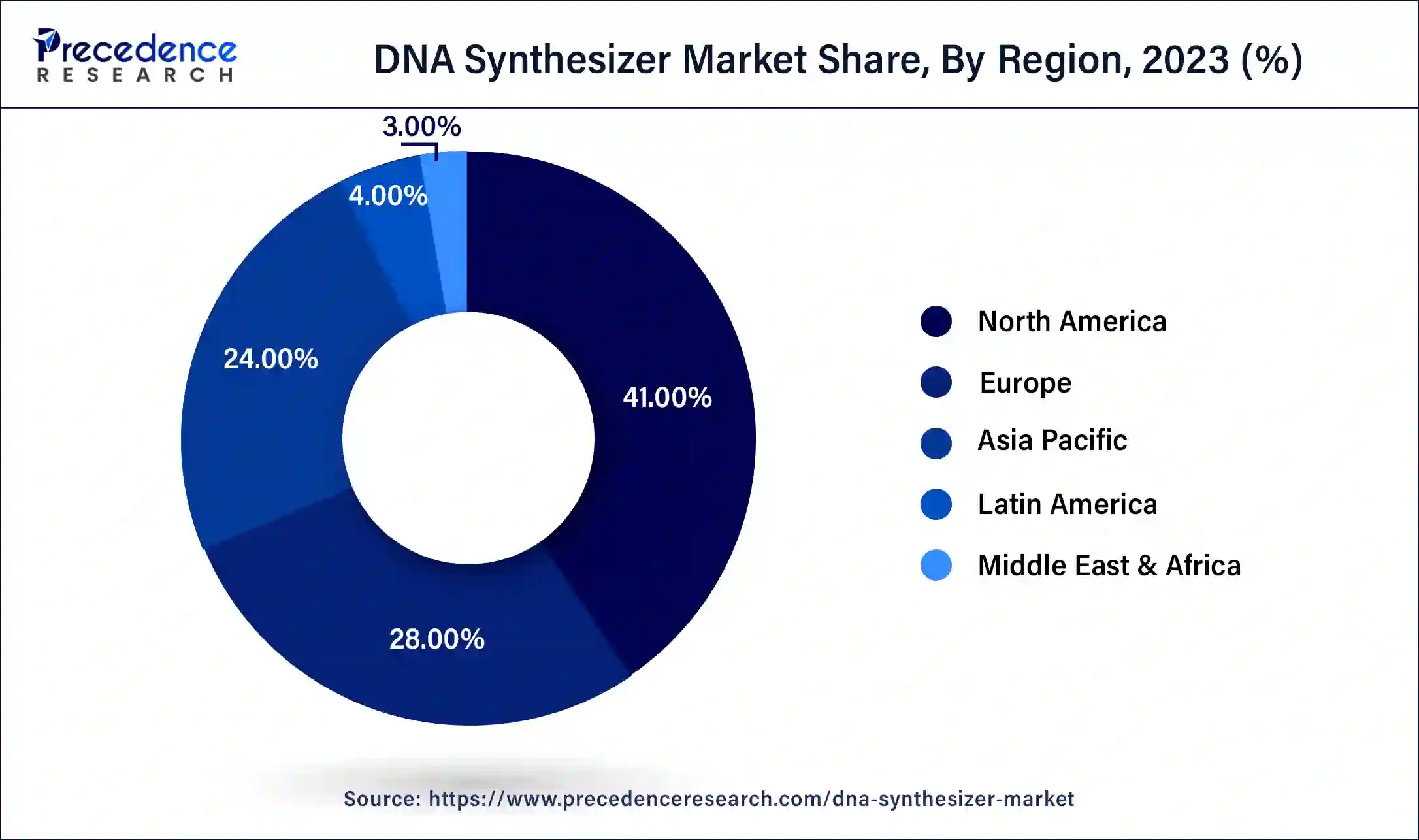The global DNA synthesizer market size was USD 314.13 million in 2023, calculated at USD 359.99 million in 2024 and is projected to surpass around USD 1,406.50 million by 2034, expanding at a CAGR of 14.6% from 2024 to 2034.
The global DNA synthesizer market size accounted for USD 359.99 million in 2024 and is expected to be worth around USD 1,406.50 million by 2034, at a CAGR of 14.6% from 2024 to 2034. The North America DNA synthesizer market size reached USD 128.79 million in 2023.

The U.S. DNA synthesizer market size was estimated at USD 90.33 million in 2023 and is predicted to be worth around USD 413.10 million by 2034, at a CAGR of 14.8% from 2024 to 2034.

North America is the leading region in terms of DNA synthesizer market during the forecast period. There is an increasing prevalence of autoimmune disorders in North America, including the United States, Canada, and Mexico. The presence of the maximum number of key players in the region is contributing to significant global revenue. According to the National Institute of Health (NIH), around 5-6% of the United States population has been affected by autoimmune diseases. AbbVie, a biotech company mainly deals with immunology drugs, is based in North Chicago, United States, with a revenue of $58.05 billion in 2022. The demand for immunological tests has increased for many DNA synthesizers in the next few years.
Asia-Pacific shows a significant growth in the DNA synthesizer market throughout the projection period. The rise in funding from startup companies, growth in research and development, and increase in metabolomics pathway studies in well-known research institutes such as India are boosting the growth of Asia- the Pacific DNA synthesizer market. For example, In June 2022, Axbio raised about $100 million for the growth of sequencing technology in series B.

In September 2022, He Jiankui, founder of genetically edited babies, sought help from the Government of China to raise a fund of US $7.2 million for a DNA synthesizer project. The project aims to develop China’s first third-generation DNA synthesis platform.
In addition, the rising rate of business activities in the market including partnerships, acquisitions, new product launches and investments are propelling the growth of DNA synthesizer market in Asia Pacific. GSK, Takeda, and Sanofi partnered with the Biologics Pharma Innovation Programme in December 2022 to research and produce the latest biologics, such as vaccines, recombinant proteins, etc.
DNA synthesizers are the devices used to understand a particular DNA molecule from a given sequence of nucleotides. DNA synthesizer helps to create DNA molecules to cure disorders by replacing damaged DNA with repaired DNA. We required enzymes, substrates, primers, and templates as components to initiate and generate a DNA synthesis. Gen Script, Synbio Technologies, Ansa Biotechnologies, and Camena Bio are the companies involved in the DNA synthesizer market across the globe. The Human Genome Project was conducted by the DNA synthesizer which the scientists proposed. DNA synthesizers can be programmed to handle batch-wise analysis, also are different from cycle time. This synthesizer is computer-based and operated by including the website.
Players involved in the DNA synthesizer market are involved in the development, production, and distribution of DNA synthesizers. DNA synthesizers are machines that enable the automated synthesis of DNA molecules. These machines are widely used in various research fields, such as genomics, proteomics, and synthetic biology.
With the rising growth of research and development activities, there is an increase in DNA synthesis and sequencing. Even Danaher showed a $7.0 billion revenue share in life science in 2022. Advancements in technology, such as novel genes, enzymes, the latest software, and other factors, are anticipated to reduce the synthesizing time. With the increasing demand for the newest technology, such as Next Gen Sequencing (NGS), there is a proportional rise in DNA synthesis, which expands the DNA synthesizer in the market. NGS captures every DNA molecule leaving nothing behind and provides maximum depth coverage. It helps in detecting and tailoring minimal residual disorder.
Growing investments in synthetic biology and research have fueled the growth of DNA synthesizers across the globe. The National Human Genome Research Institute (NHGRI) has recorded the DNA expenses used for sequencing that the Institute funds have helped in the improvisation of DNA technologies.
| Report Coverage | Details |
| Market Size in 2023 | USD 314.13 Million |
| Market Size in 2024 | USD 359.99 Million |
| Market Size by 2034 | USD 1,406.50 Million |
| Growth Rate from 2024 to 2034 | CAGR of 14.6% |
| Largest Market | North America |
| Base Year | 2023 |
| Forecast Period | 2024 to 2034 |
| Segments Covered | By Product Type, By Application, and By End-User |
| Regions Covered | North America, Europe, Asia-Pacific, Latin America, and Middle East & Africa |
Rising demand for diagnostic activities for multiple diseases
The rising need to diagnose various diseases boosts the DNA synthesizer market growth during the projection period. Nearly 1 in 10 Americans are affected with the ongoing Type-2 diabetes mellitus, which is predicted to be around 30 million Americans who suffer from undiagnosed or rare diseases. For a better understanding of the disease and its treatment, accurate diagnosis is necessary where DNA synthesizer actively performs and prevents people from passing the disorder to future generations.
For instance, Nutcracker Therapeutics, Inc. has presented NTX-250, an oncology mRNA therapeutic that can draw out anti-tumor responses in murine tumor models and induce an immune response in human papillomavirus.
Risks of false detection
Numerous diseases can be detected through DNA samples, such as Sickle cell, Cystic fibrosis, Down syndrome, etc. DNA testing helps us understand any mutation in the chromosomes, genes, or proteins. When sequencing, there is a false detection of DNA strands from the nucleotides, and this leads to higher error rates with less output. The performance as per the requirement needs to improve. Epigenetic factors, mosaic mutations, and mitochondrial genome mutations are a few of the limitations of DNA sequencing. Epigenetic factors can be termed as the individual behavior and environment that alter the function of the responsible genes. Such risks associated with DNA sequencing limit the growth of the market by acting as a restraint for the market.
Use of DNA synthesizer in synthetic biology
The rise in demand for therapeutic genome editing and disease diagnostics is leading to the need for more DNA synthesizers in the market. Synthetic biology includes DNA storage, molecular diagnostics and biological medicine which apparently increases the demand for advanced machines to detect the DNA strands. Natural medicine is prepared from living organisms that can detect, prevent and treat various diseases. Few biological drugs include vaccines, antibodies, therapeutic proteins, and others. And the purchase price of this medicine is costly as it is mixed with chemical ingredients, which is challenging to prepare.
For instance, In May 2023, Cellular Biomedicine Group addressed that they jointly licensed and collaborated with Janssen Biotech, which studies the cure of lymphoma specifically for C-CAR066.
Automated DNA synthesizers are anticipated to dominate the global market during the projection period.
As a growing need for efficient synthesizers in the different life science labs for research activities to study and understand the vital role of DNA synthesizers in molecular biology. In the development and manufacturing of novel drugs and funds being supplied from major key players. This has raised the number of biotechnologies, life science, and pharmaceutical companies in the growing need for new treatments to cure disorders.
The benchtop DNA synthesizers segment shows an attractive growth in the DNA synthesizer market during the forecast period.
The purpose of using a benchtop DNA synthesizer is to raise the speed and efficacy of research conducted in industries and academic laboratories. It prevents the DNA sequences that can be harmful. This synthesizer is mainly used by trainees in biosecurity and biosafety.
Diagnostics shows a lucrative growth in the DNA synthesizer market throughout the forecast period.
Proper diagnosis can be made by considering data and understanding from physical examination, various tests such as blood tests, biopsies, and patient medical history. The prevalence of Alzheimer's disease has increased in the last decade. Alzheimer's is affected due to the combination of multiple genes, which can increase or decrease the risk of the disorder. As per the Alzheimer's Association International Conference, it was found that consuming processed foods leads to a decline of cognitive; nearly 6.5 million are living with Alzheimer's. Using a DNA synthesizer makes it easier to detect and then later leads to the treatment of the disease.
The research and development segment is anticipated to grow during the forecast period.
The increase in DNA content based on genomics, transcriptomics, and proteomics to improve the technologies for the growth of the DNA synthesizer business. Thereby staying ahead of the competitors' companies and growing research on a micro-scale which eventually increases the biological products such as antibodies, vaccines, etc. The demands for drug discovery have evolved, which has enrolled more clinical trials.
Biotechnology companies are expected to dominate the DNA synthesizer market throughout the forecast period.
Biotechnology companies initiate their business from an embryonic stage, that is, diagnosis, prevention, and treatment of disease. These firms have majorly scaled in the market after covid-19 with the rise in the detection of virus strains, how it can be controlled on a large scale, and its cure. Increase in the research and development for the vaccine to prevent its spread, latterly growing the economics of biotechnology companies worldwide. Developed biotechnology regions like North America and Europe monitor India's development of biotechnology firms such as Biocon Biologics Limited, with Rs 1,507 crores for biosimilars in 2022. This economic development from biotechnology firms is attracting overseas similar markets for collaboration, thereby growing the market worldwide.
For instance, Statista's data states that India has recorded revenue of 39.3% covid-19 vaccine in the Indian market in the year 2021-22.
Academic and research organizations are anticipated to grow in the predicted period.
DNA synthesizers are used in nucleic acid assays, which include primers and probes, plasmid control, and serological assays, such as in the SARS CoV-2 neutralization antibody detection kit, even for controlling monoclonal antibodies, vaccine production, etc. Academic and research organizations are researching these significant tests and received funds from government bodies bolstering the DNA synthesizer market expansion.
Segments Covered in the Report
By Product Type
By Application
By End-User
By Geography
For inquiries regarding discounts, bulk purchases, or customization requests, please contact us at sales@precedenceresearch.com
No cookie-cutter, only authentic analysis – take the 1st step to become a Precedence Research client